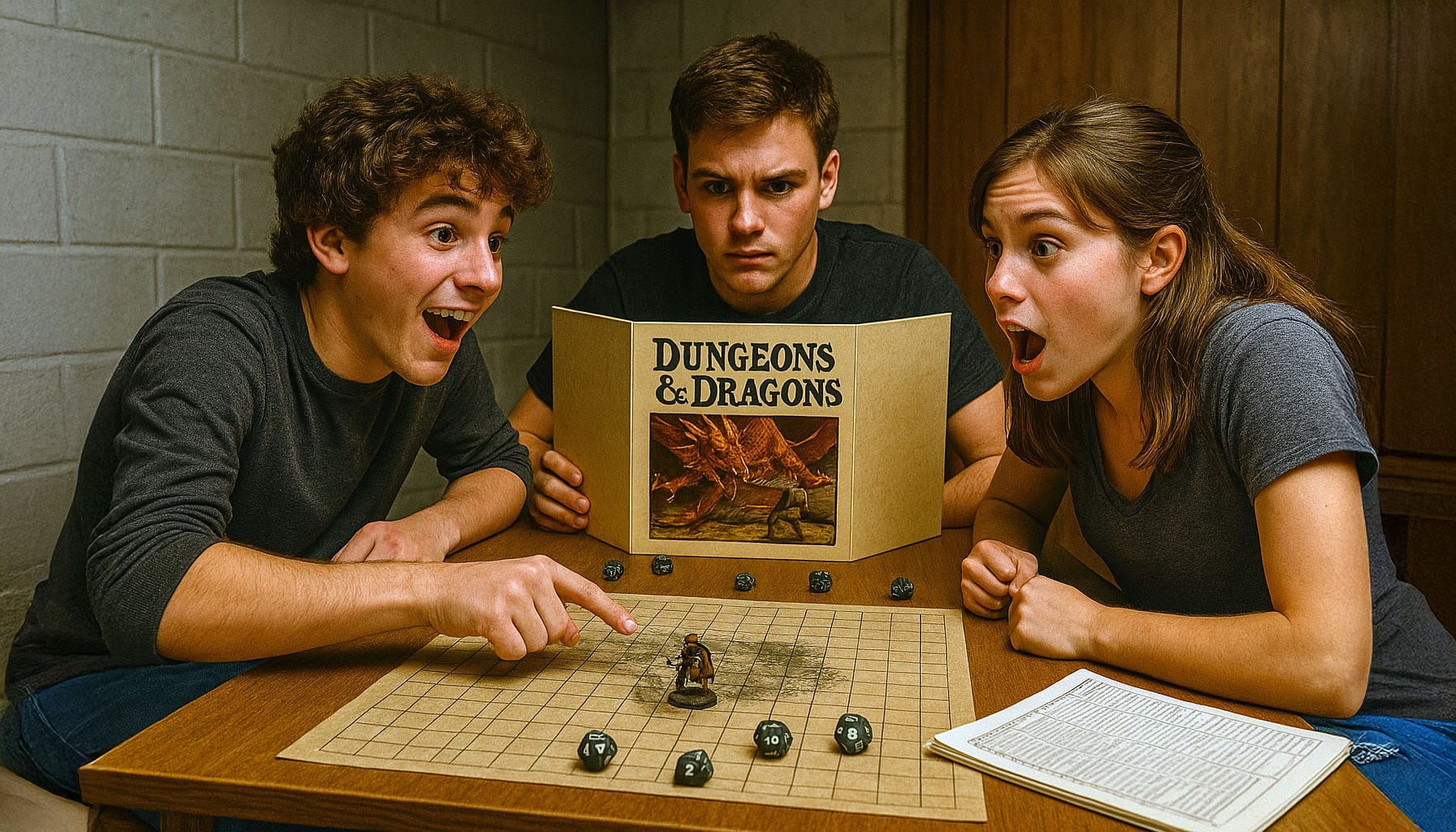Ah, the golden days of Dungeons & Dragons, back when the only clouds we worried about were the overcast skies in our imagination (or Mazes & Monsters!) Back then, adventuring through dungeons and over dragons was a journey marked with enough quirks to rival a wizard’s hat collection. Before the birth of forums and the ever-present blip of online connections, D&D relied on clandestine gatherings in basements and hobby shops. It was a time when dice rolled with the unassuming clatter of pure, uncut nerdery.
During those days, D&D wasn’t just a game; it was a lifeline thrown to the dreamers among us. Despite—or perhaps because of—being labeled as uncool, D&D brought together a motley crew of players who found joy in the magic of storytelling and the camaraderie of fellow misfits. Before the internet opened its digital floodgates, any knowledge of the game passed between players directly and deliberately, allowing each group to shape its unique culture. This quaint era of D&D fostered creativity and brought unknown heroes out of obscurity, armed with polyhedral dice and penciled character sheets.
The treasures we hunted were much like the relics in our games: found only after relentless quests through local hobby shops, where the aroma of newly printed books mixed with the scent of strategic train layouts. We cherished every new module or piece of lore discovered, treating our gaming essentials with near-sacred reverence. Late nights spent huddled in someone’s basement became the backdrop for adventures more vivid than any CGI movie could replicate.
Before URLs and WiFi became household terms, D&D was a more intimate affair, a storytelling hearth that kindled warmth shared by friends around a table. This vintage era wasn’t just about playing a game. It was about crafting worlds fueled by imaginations unrestrained by digital confines. What follows is a journey through those analog times—a tapestry of nostalgia woven with tender memories and laughter echoing through the years.
So, grab your cloak and spell components, and let’s wander through a time when dragons roamed freely in our minds and dungeons were a familiar, albeit metaphorical, realm we gladly ventured into weekend after weekend.
When D&D Wasn’t Cool (But We Were)
Today, D&D is embraced in geek chic circles and pop culture, but there was once a time when daring to play demanded the audacity of a bard facing a tone-deaf dragon. Back then, admitting you enjoyed rolling dice with friends could be greeted with befuddled stares or, occasionally, accusations of devil-worshipping—a saga as mythical as any campaign. Those were times when wearing your D&D badge required confidence and creativity.
Embracing those quirky elements, D&D players of yore recognized the courage in choosing fun over conformity. Seeing it as a badge of honor, many were happy to occupy this niche. We carved out spaces where impromptu impersonations of critical heroes occurred without anyone skipping a beat. D&D was a clandestine language we all spoke, letting anyone join who knew the joy of a well-rolled natural 20.
Try my AI Tabletop RPG generators...and an extensive library of content!
It was an inclusive universe before the term trended on social media. Back then, the magic of D&D was that everyone was welcome, regardless of one’s place in the social hierarchy. Tables surrounded by would-be heroes saw budding alliances that overcame real-world differences. Gamers assembled by fate, or perhaps by arcane forces, united their destinies through the draw of imaginary quests. Every game grouped together an assortment of characters that any bard would sing praises about.
Group gatherings led to revelatory experiences. They were where the marginalized found common ground and shared victories. D&D made overlooked youths feel like champions, wielding pens like swords, ready to stab at any meandering monologue about the game’s weird rules. Here lies the irony; while D&D was deemed uncool, the coolness lay in the acceptance and understanding forged within its sacred circles. Players who felt invisible elsewhere discovered here a place to belong.
Through all-night campaigns and caffeine-fueled imaginings, those early gatherings allowed individuals to reveal their true selves—not as heroes, but as friends. The essence of D&D revolved not only around dice and dragons but in the shared experience of belonging, a treasure perhaps more valuable than any in-game loot.
⚔️ Fantasy RPG Random Tables Books
Make life as a Gamemaster easier…
If you play Dungeons & Dragons, Pathfinder, or other fantasy RPGs, this
RPG random tables series
is packed with encounters, NPCs, treasure, and more. Available in eBook or print—either way, you’ll have a wealth of adventure ideas at your fingertips.
Finding Your Party in the Wild
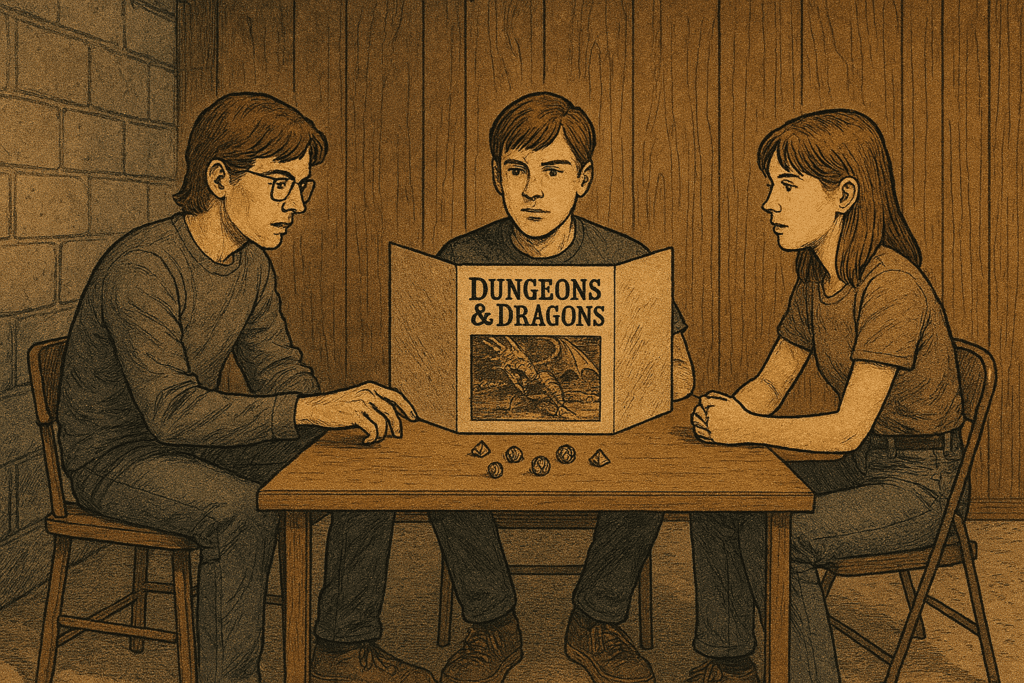
In the pre-internet wilderness, uniting with fellow D&D enthusiasts felt like finding a rare treasure chest amidst a monotonous sea of board games. The hurdles were high, but the rewards were sweet—each group formed a pocket of fellowship and adventure. These were the days when loyalty to the game and each other meant transcending mere acquaintanceship; it meant becoming a party worthy of epics and intrigue.
As kids, we’d concoct creative means to find companions, from posting hand-drawn flyers on corkboards in community centers to dashing through faint rumors about like-minded souls shared by that one peculiar cousin. There was also the occasional brave soul who diversified their social profile just enough to wriggle their way into the chess club, all under the pretense of another “board game.” Talk about strategic thinking!
Being included in a game group was a matter of fate and fortitude, where sometimes possession of the most obscure rulebooks was the golden ticket to camaraderie. You might not have owned every module, but if your dice bag was brimming, you were instantly a person of interest. And the first time you heard the words “roll for initiative” felt transcendent; it marked the moment you realized you had found your people.
Ways Players Found Groups:
- Posting hand-drawn flyers at the local rec center
- Finding a group through your cousin’s weird friend
- Being allowed in because you had the rulebooks
- Sneaking into the high school chess club pretending it was “just a board game”
- Word-of-mouth at the comic book shop
- Spotting someone reading a rulebook in public and joining in
- A friendly match of other board games leading to D&D invitations
- Overhearing secretive game talk on school buses
- Teachers as DM leads after overhearing students’ passion for fantasy
- Summer camp mentors revealing their true RPG identities
- Bulk buying of large pizza attracting tabletop enthusiasts
- Random encounters with hobby shop patrons we recognized online
In this pre-digital era, each discovery of kindred spirits was met with the kind of excitement reserved for stumbling upon a rare dragon lair. Those early game groups were vital. They became the tapestry upon which adventures were woven, binding us as far more than players passing turns. We became a party, a conglomerate of misfit heroes battling the mundane one dice roll at a time.
Though finding your party sometimes felt like an epic quest on its own, it taught us that the road taken mattered just as much as the destinations we reached. The scarcity of D&D adventurers only amplified the quality of the bonds we formed, creating lasting memories that resonate today among the echoes of rolling dice.
The Pilgrimage to the Hobby Shop
For many fledgling adventurers, the journey to the local hobby shop was a sacred rite in the chronicle of D&D. We were heroes on bicycles, determined as rangers traversing perilous paths. Perhaps those paths were paved with asphalt rather than forest trails, but the journey felt no less heroic. I don’t think parents today would let eight or ten year old children bike miles to a hobby shop, but we turned out okay. It was an experience that’s hard to describe now as someone who drives every day.
After biking there, stepping into the hobby shop was to cross into a realm abundant with wonders and exotic curiosities. The atmosphere was charged with the scent of fresh rulebooks, mingmingling with anticipatory delight. Glistening trinkets of gaming delight beckoned like mystical artifacts, waiting to be deciphered and wielded in our campaigns. Here, adventure awaited amid action figures and strategic game layouts, not to mention the all-knowing gaze of the “model train guys.”
These venerable sages judged newcomers with the practiced air of true connoisseurs, showcasing their elaborate layouts that told stories of their own. Around them, a collection of eager-eyed adventurers immersed themselves in the latest Dragon Magazine, engaging in heated debates over which lead mini posed as a rogue most daring, or whether that one bonus should indeed be allowed.
Highlights from Hobby Shop Adventures:
- Being judged by the “model train guys”
- Reading Dragon Magazine cover-to-cover at the counter
- Debating which lead mini looked most like your rogue
- Arguing about THAC0 before you knew how to pronounce it
- Binding over seeing someone else with the same rulebook
- Discovering unreleased modules by accident while browsing
- Finding single dice for sale and learning math by necessity
- The sheer joy of finding a perfect miniature
- Flipping through model catalogues to steal ideas
- Loitering until the owner asked if we needed “anything certain”
- Anticipating the new Dragon Magazin
- Leaving reluctantly yet knowing you’d return
And don’t get me started on Waldenbooks in the mall … another treasure trove of tabletop RPG materials!
But back to the hobby shop adventures. The pilgrimage usually concluded triumphantly at the nearby Dairy Queen where, ice cream in hand, we poured over our newfound treasures and discussed plans of daring escapades. This bi-weekly ritual was evidence that it wasn’t just the destination at the store that mattered, but the entire experience wrapped in camaraderie.
As the day’s adventure came to a close and we rode our bikes home, we left as triumphant explorers, equipped with newfound skills in modular design. Through these collective experiences, our friendships blossomed, weaving together a rich narrative of discovery, strategy, and boundless imagination against the backdrop of a dusky afternoon.
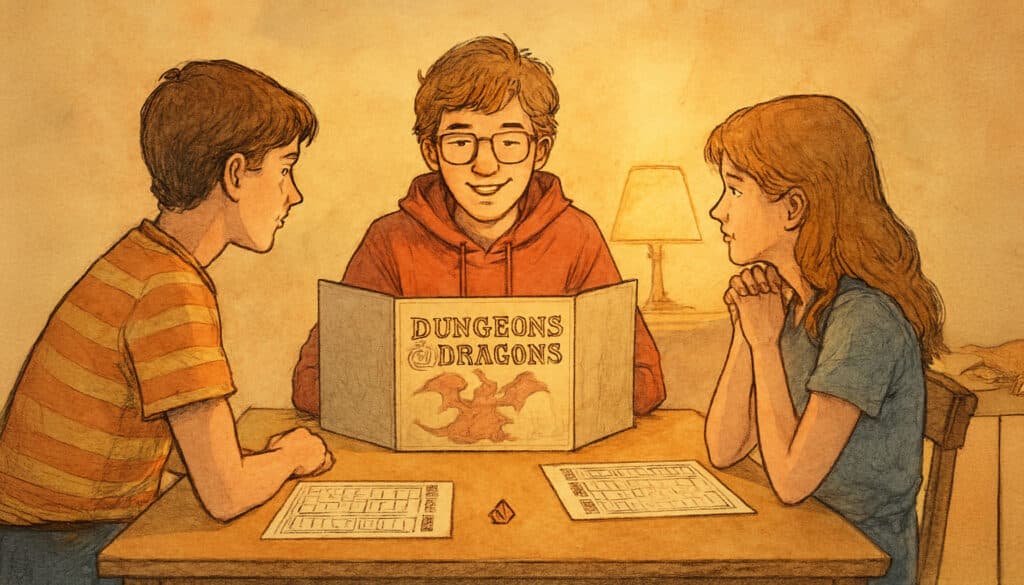
Basement Epics and Sleepover Campaigns
Imagine caverns illuminated by nothing but fairy lights and lava lamps—a humble setup transformed into epic lairs where campaigns unfolded over countless hours. Basements became the hub of fantasy as sleepovers shifted from idle chatter to rollicking odysseys into far-off lands. Armed with character sheets and rulebooks, we huddled around makeshift tables, immersing ourselves in quests as grand as they were absurd.
⚔️ Fantasy RPG Random Tables Books
Make life as a Gamemaster easier…
If you play Dungeons & Dragons, Pathfinder, or other fantasy RPGs, this
RPG random tables series
is packed with encounters, NPCs, treasure, and more. Available in eBook or print—either way, you’ll have a wealth of adventure ideas at your fingertips.
Each sleepover saw a room brimming with eager gamers carrying sleeping bags and high spirits. Makeshift DM screens crafted from cardboard whispered tales of hidden treasures and dark foes in dice-fueled stories. It was here that friendships solidified under the glow of incandescent bulbs and every tossed “d20” die became legend. Ordinary items quickly became integral components of our campaigns: soda cans doubled as potions of vitality, pizza boxes unfurled dynamic battleground maps, and bowls of popcorn evolved into dice arenas.
Memories of Sleepover D&D Sessions:
- Using pizza boxes for dungeon maps
- Rolling dice in popcorn bowls
- Arguing over alignment until 3 a.m.
- Someone always falling asleep during initiative
- Accidental soda spills turned into “river obstacles”
- Tent forts housing “offstage” scenarios
- Enlisting plushies as formidable in-game foes
- Rediscovering forgotten dice between couch cushions
- Soda-fueled openness revealing character’s secret plans
- Professorial lectures on character backstory from enthusiastic DMs
- Warring over the room’s temperature for atmospheric authenticity
- Misappropriating someone’s guitar for bardic inspiration
- Unapologetic laughter over the lamest puns
- First battle wounds delivered by couch corners in dramatic combat
In the glow of flashlights and jittery caffeine, there birthed daring strategems and spontaneous detours that inevitably veered into comedic territory. Dice fell and rose like tides, and the buzz of discovery echoed around the room. Stories spooled forth from our imaginations, interwoven by the common pursuit of epic storytelling.
These weekends left us with memories both cherished and legendary, forged in the fires of adventure. No matter how sleep-deprived or exaggerated the quest, we left each sleepover with deeper friendships and a renewed thirst for imagination, ready to meet the road again the following week.
The Inclusive Magic of a Niche Hobby
While D&D was still seen as fringe nerdiness during its early days, it possessed an undeniable inclusive magic—a world where everyone could be a hero, no gatekeeping allowed. Players found solace within its bounds, no matter their background, status, or quirks. It was here that those deemed outsiders, the creatively inclined, and the inimitably unique formed kinships, reveling in the thrill of shared conquests.
In a space unshackled by judgment, where rules lawyering was less about control and more about the spirit of play, players banded together to transcend those very rules. Story arcs and theatrical feats unfurled in joyous, unpolished glory, where participation mattered more than perfection. Without the shackles of online discourse, every player voice was valued, and multiple interpretations were welcomed rather than derided.
For many, D&D was a glimpse into an open world that provided sanctuary and empowerment. The table became a realm where everyone was welcome to wield the ironclad sword of narrative, whether it was the Dungeon Master’s sister, a loner from physics class, or the dramatic thespian finding a stage without lines to remember.
Ways Pre-internet D&D Was More Inclusive:
- No gatekeeping—if you showed up, you played
- Rules lawyering was annoying, not political
- Everyone was weird so nobody cared
- The DM’s sister played and no one batted an eye
- Announcing alignment changes was a team event
- Embracing the uniqueness of each player’s character
- Personalities larger than life thrived unmocked
- Championing quality role playing over strict rule adherence
- Unrestrained creativity filled every session
- Forging real friendships from imaginary quests
- Inviting players beyond adventuring kin
- Sitting before the DM’s screen meant freedom to be one’s self
The inclusion fostered by D&D was quiet but profound, a dignified nod to its ever-prevailing charm. Players became legendary knights without needing to polish social armor. Back then, D&D carried a message—of acceptance, creativity and mutual support—embedding it within all who carried their dice pouches proudly. It was a gathering where personality quirks became assets, and fantasy offered a delightful respite from reality.
In retrospect, those moments weren’t just about goblins defeated but barriers broken. A niche hobby became a welcoming home where the strange, the fantastical, and the heartfelt were cherished, setting a standard for genuine acceptance that extended far beyond our beloved gaming tables.
Try my AI Tabletop RPG generators...and an extensive library of content!
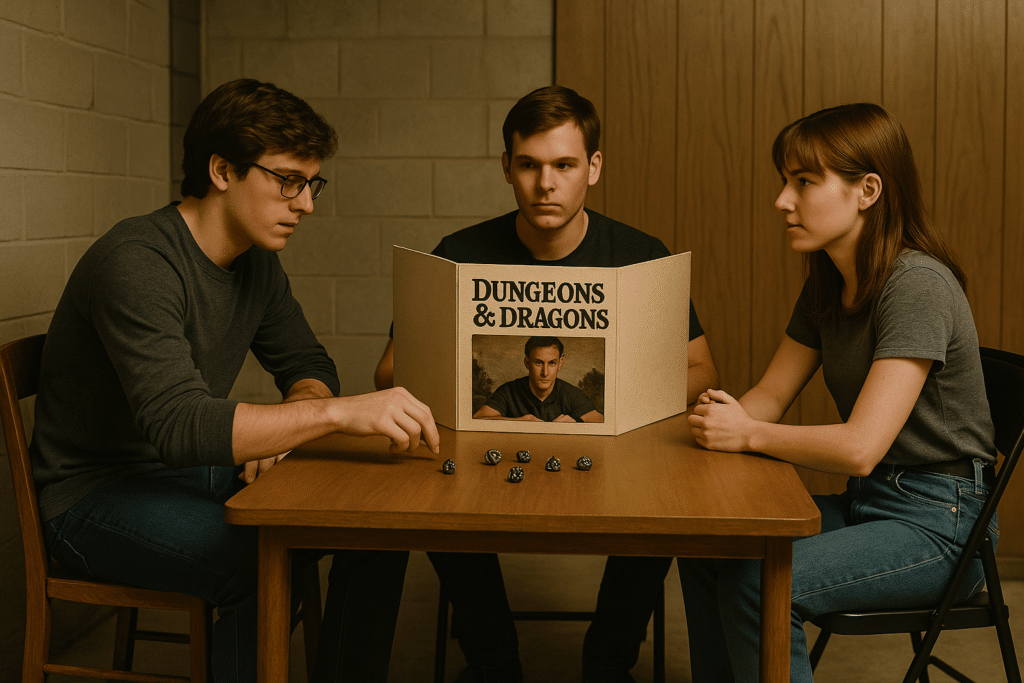
When the Internet Came to Town
The arrival of the internet changed the D&D landscape eternally, offering wider avenues for socialization, play, and storytelling. This monumental shift opened portals to an intertwined world of information and ideation but also brought with it the clatter of noise that could challenge even the cheeriest bards’ disposition.
With online access, D&D luminaries expanded their reach across oceans and continents, fueled by the wonder of a connected world. New players joined the fray but were greeted with the inevitable cacophony of conflicting opinions and gatekeeping. The camaraderie that had marked early D&D’s in-person origins risked being swept by the deluge of forum debates and edition wars, an unruly beast that spouted opinions long and loud.
The magic intimacy shared by small tables of friends transitioned into guilds or groups with members as distant as they were diverse. With these digital achievements came greater understanding and expanded player bases, yet a specter loomed—how to preserve the spirit that made Dungeons & Dragons cherished in the first place, amid the online barrage?
Community vs. Commentary
The internet’s arrival transformed the landscape into a sprawling kingdom of conversation, some constructive and others more chaotic. Gone were the days of sheltered tabletop havens; in their place unfurled a multiverse of lively forums, Reddit threads, and YouTube commentary. The D&D lore and mechanics, once whispered among friends, now blared in pixels and bytes for all to dissect.
This gave rise to an era of hot takes and edition wars, where optimization guides threatened to strangle players’ creativity by mandating strict adherence to maximized stats. The once-bespoke introductions of character creation yielded to pressure from elaborate online critiques. Discontent roamed unchecked as debates over the “right way” to play flared—and suddenly, the uninterruptable fun of tabletop whimsy stumbled under performance expectations loftier than a lich’s tower.
There arose performative DMing, a trend spurred by watchful eyes more intent on staged theatrics than collective storytelling. Actual play shows fascinated audiences but unwittingly set a standard few casual tables could emulate, casting those who preferred simple narrative rhythms into comparative shadow. Such standards elevated some but discouraged others from warm, inclusive exploration.
Changes to D&D Dynamic Due to the Internet:
- Optimization guides killing weird character builds
- Online debates over “the right way” to DM
- Actual-play shows setting unrealistic standards
- Shaming people for liking the “wrong” edition
- Evening meet-ups replaced with scheduled twitch watches
- Online rules forums eclipsing spontaneous out-of-box thinking
- Comment chains questioning every house rule
- Social media divides over which campaign setting reigns supreme
- Players feeling rushed to reach “optimal” level builds
- Discussions more pedantic over nitty-gritty details
- Homebrew innovations receiving either high praise or harsh critique
- Heroes feeling disconnected from imaginative humor
- In-person gatherings nurturing their own unique appeal
This explosion of discourse fragmented the community much like a fireball launched into a teetering skeleton horde. Old loyalties persisted, but newfound digital factions sprang forth—each convinced of their superior interpretation. While the diversity of thought had value, the need to out-comment each other at times overshadowed the simple joy of rolling to hit. As newfound voices ascended across far-flung servers, those who fondly remembered humble beginnings clung to storytelling’s heart in a sea of digital drift.
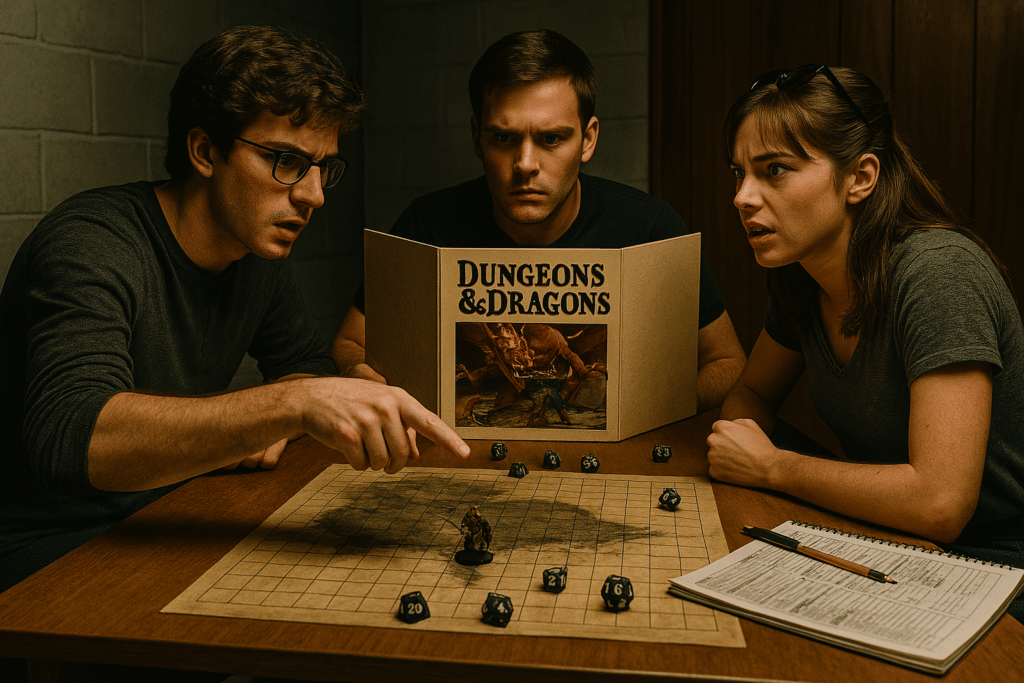
Remembering What Made It Special
In pondering what made early D&D magical, we are reminded of why it held a place close within our hearts. Before the rise of LED screens and online forums, gameplay revolved around human connection, where face-to-face bonding and shared creation took center stage. Players gathered around tables less concerned with performative pressure and more focused on deriving simple joy from collaborative storytelling.
Before scrolling smartphones became ubiquitous, the table was a sacred sanctuary from distraction. Drawn maps bore witness to tales spun in pencil strokes, roles filled with laughter untainted by scrutinizing snark. These nascent gatherings, free of judgment, exuded an anchoring quality that let players flow seamlessly between imagined worlds and reality, bridging the two with genuine connection.
A campaign wasn’t just a rigmarole of min-maxing; it was a journey where imperfections blossomed consciousness into courageous characters harder to erase than ones made of pure stats. Players didn’t desire likes; they wanted narrative as rich and detailed as old scrolls, formed organically rather than meticulously crafted for viewer consumption. It wasn’t performative, but an art within and beyond the tabletop.
Reasons Early D&D Felt So Pure:
- No phones at the table—because they didn’t exist
- Maps drawn in pencil on graph paper
- Laughter at bad puns, not snarky threads
- Creating something together, not performing for likes
- Late-night pizza leading to equally cheesy jokes
- Friendships celebrating unique quirks rather than online notoriety
- Real dice—tangible and clicking with infinite promise
- Embracing imperfect rules rather than demanding perfection
- Character-driven storytelling transcending trope-driven analytics
- Characters reflecting parts of ourselves, unembellished yet cherished
Reflecting upon this nostalgic purity, it is clear that while the internet has offered vast landscapes for D&D’s continued growth, it also risks shadowing the ethereal camaraderie upon which its earliest days thrived. Those of us who experienced the charm firsthand still remember the shared adventure, an endeavor into an imaginary land where laughter and loyalty were our strongest alchemical components—outshining treasure troves but never eclipsing the friendships forged.
Final Thoughts on Nostalgic D&D
Delving into nostalgia unveils a treasure trove of memories, a past where D&D’s essence was intertwined with dice clicks on a basement table and imagination unshackled by scrutiny. Those early days echoed with laughter and discovery among friends who understood that being “uncool” was the coolest form of rebelliousness. These indelible memories dance upon the tapestry of our past, embroidered with wistfulness and cheer.
For those of us who explored realms of wonder before WiFi’s descent, there lies an enduring respect for the simple, enduring joy of face-to-face storytelling. D&D was a beacon of camaraderie, inclusivity, and creative exploration, breaking barriers and building bridges with every shared narrative. Where dice and narrative once reigned supreme, modern iterations demand tech-savvy acrobatics from digital communities craving bards and beasts alike.
While the internet breathed new life into the game, offering broader horizons and innovative experiences, it also ushered in challenges that demanded adaptation without losing the soul of storytelling. We stand at a crossroads, weaving new form with old substance, holding close the moments that first ignited our elven arrows of imagination.
Dear reader, has the internet altered something you hold dear? I’ve had my share of grappling with this digital hydra. While it has helped D&D thrive and evolve, there remain pockets of longing for the purity of simpler times. If you find yourself feeling a pang of nostalgia, remember that as long as our storytelling endures and friendships continue to bloom, we carry a bit of that magic with us. Every hero’s journey begins with a single roll of the dice, and in our hearts, we remain forever adventurers.
⚔️ Fantasy RPG Random Tables Books
Make life as a Gamemaster easier…
If you play Dungeons & Dragons, Pathfinder, or other fantasy RPGs, this
RPG random tables series
is packed with encounters, NPCs, treasure, and more. Available in eBook or print—either way, you’ll have a wealth of adventure ideas at your fingertips.

